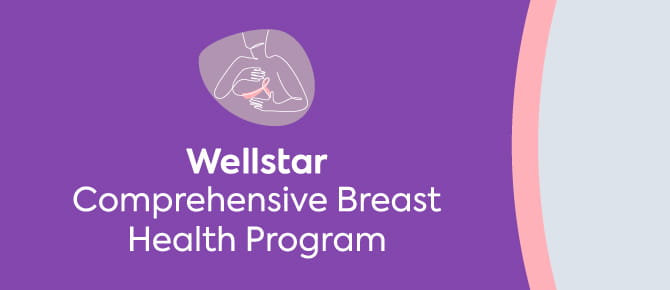
Wellstar Women's Health
Comprehensive Care for Every Life Stage
From adolescence to menopause and beyond, we offer advanced, specialty care tailored to your changing healthcare needs in every stage of life. We are committed to helping women live longer, healthier lives.
About
Women's Health at Wellstar
Wellstar women's health experts understand the conditions unique to women in all stages of life. Our comprehensive, compassionate team offers personalized care in a comfortable environment. We treat various health issues and life events, from gynecology and pregnancy to fertility and breast health. We also have extensive experience treating gynecologic cancers, as well as urogynecologic and other pelvic conditions.
Staying healthy is easier with convenient, state-of-the-art diagnostic, surgical and maternity services. Every woman should schedule an annual check-up at least once a year. As part of your well-woman exam, your provider will take your blood pressure, perform a Pap smear, pelvic exam and a breast exam. Depending on your age and medical history, your physician may recommend additional testing to catch potential health issues early.
Our Care Philosophy
Wellstar Women's Health understands that every woman is unique, and we know how to empower you to achieve optimal health. We are committed to caring for you with compassion and expertise.
Fertility
Deciding to have a family is a personal decision with many options. Based on your health, our team will help you achieve your goals and craft a plan tailored for you.
Obstetrics
Whether you need routine prenatal and delivery services or high-risk pregnancy care, we're here to ensure the health and wellness of you and your baby.
Gynecology
Healthcare needs change as you age. Get the most effective care for everything, from puberty and sexual health through menopause and hot flashes.
Breast Health
We use the latest screening technologies to monitor your breast health, which can help doctors diagnose abnormalities or breast cancers at the earliest stage.
Our Care Team
Our team partners with you to ensure you receive the comprehensive care you need and the experience you desire. For our expecting patients, we offer a variety of birth and care plans. Our gynecological team provides integrated care with other medical specialties, both medical and surgical, to determine the best possible treatment plan for you. Our team members collaborate with experts in other medical disciplines throughout Wellstar to provide you with personalized care tailored to your needs.
Comprehensive, specialized care
Medical specialists collaborate to create patient-centered care plans. Our multidisciplinary teams often include board-certified OB/Gyn’s and certified nurse-midwives who have the most advanced training and knowledge in their fields. They collaborate with specialists, including:
- Breast Surgeons
- Gyn-oncologists
- Maternal-fetal medicine specialists
- Reproductive endocrinologists
- Urogynecologists
Innovative technology, individualized treatment
You will experience the convenience and commitment of a dedicated team providing the highest quality care. We will develop a plan that is specific to you based on your needs and goals. Team members may include:
- Advanced nurse practitioners
- Genetic counselors
- Lactation and breastfeeding specialists
- Physical therapists
- Specialized imaging technicians
- Ultrasound professionals
Wellstar Foundation
As a not-for-profit, gifts to the Wellstar Foundation make it possible to provide patients with additional resources and amenities for a higher level of comfort and care. Every dollar donated supports Wellstar’s vision of delivering world-class healthcare, carried out through patient-centered programs, advancements in technology and making reliable healthcare available close to home. Your generosity also makes it possible to provide free screenings and diagnostic services to uninsured and underinsured patients every year. For more information about how to support our fight against disease, visit the Wellstar Foundation.

Helpful Links
Services
- Labor and Delivery
- Obstetrics
- Maternal-Fetal Medicine
- Reproductive Endocrinology and Infertility
- Certified Nurse Midwifery
- Expectant Mother and Family Education Classes
- Gynecology
- Urogynecology
- Gynecologic Oncology
- Preventative Care and Contraception
- Minimally Invasive Gynecologic Surgery
- Robotic Gynecologic Surgery
- Pelvic Floor Physical Therapy
- Comprehensive Breast Health Program
- 3D Mammography
- Digital Mammography
- Breast MRI
- Breast Biopsy
- Breast Surgery
- Breast Reconstruction
- Genetic Counseling

8 Heart Health Facts for Moms-to-be
Being proactive about heart health can help prevent life-threatening problems for pregnant women.
Learn more
Take the Mystery Out of Menopause
At Wellstar, our compassionate women’s health team provides individualized care to help women navigate this stage of life.
Learn more
Wellstar Expands OB-GYN Services in Spalding, Upson Counties
Griffin OB-GYN Clinic and Renew Gynecology have joined Wellstar Health System.
Learn more

Navigate Your Breast Care with Concierge Services
Our program supports you with a full team of experts dedicated to your breast health care.
Learn more
Don't forget your keys to family health
The Atlanta Business Chronicle discusses how to avoid health problems with pediatric and women's health experts.
Learn more
The Importance of Regular Mammograms
Wellstar uses state-of-the-art imaging technology to help identify cancer sooner, so we can treat it faster. Getting a screening mammogram can save your life, so don’t delay.
Learn more
A Candid Talk About Your Breasts
A panel of women’s health experts discuss the latest on breast self-exams, breast cancer screenings and what you should be doing to be your healthiest.
Get the scoopLocations
Suite 220
Marietta, GA 30060
Suite 260
Hiram, GA 30141
Suite 150
Woodstock, GA 30189
Suite G
Alpharetta, GA 30004
Suite 200
LaGrange, GA 30240
Suite 100
Lithia Springs, GA 30122
Suite 9A
Austell, GA 30106
Suite 206
Marietta, GA 30062
Suite 301
Acworth, GA 30101
Suite 304
Holly Springs, GA 30114
Suite 300
Marietta, GA 30060
Suite 500
Marietta, GA 30060
Suite A210
Douglasville, GA 30134
Suite 206
Smyrna, GA 30080
Suite 1320
Acworth, GA 30101
Suite 420
Marietta, GA 30060
Suite 1400
Hiram, GA 30141
Suite 200
Austell, GA 30106
Suite 420
Marietta, GA 30060
LaGrange, GA 30240
Suite 500
Austell, GA 30106
LaGrange, GA 30240
Suite 115
Powder Springs, GA 30127
Building 2
Smyrna, GA 30082
Smyrna, GA 30082
Marietta, GA 30062
Suite 105
Marietta, GA 30066
Suite 110
Alpharetta, GA 30022
Hogansville, GA 30230
Suite 100
Acworth, GA 30101
Suite 105
Marietta, GA 30062
Norcross, GA 30071
West Point, GA 31833
Suite 120
Kennesaw, GA 30152
Smyrna, GA 30082
Suite 8A
Austell, GA 30106
Suite 105
Austell, GA 30106
Suite 400
Alpharetta, GA 30004
Marietta, GA 30060
Suite 115
Atlanta, GA 30341
Suite E
Alpharetta, GA 30009
Smyrna, GA 30082
Suite 216
Marietta, GA 30062
Atlanta, GA 30319
Decatur, GA 30034
Suite B
Douglasville, GA 30134
Suite 704
LaGrange, GA 30240
Suite B
Douglasville, GA 30134
Building B
Austell, GA 30106
Suite C
Woodstock, GA 30189
Suite E
Woodstock, GA 30189
Suite 303
Douglasville, GA 30135
Suite C
Woodstock, GA 30189
Suite 400
LaGrange, GA 30240
Medical Office Building 2nd Floor
Augusta, GA 30912
Medical Office Building 5th Floor
Augusta, GA 30912
Augusta, GA 30909
Professional Office Building 2 2nd Floor
Augusta, GA 30912
Cancer Center 1st Floor
Augusta, GA 30912
Augusta, GA 30912
Medical Office Building 5th Floor
Augusta, GA 30912
Augusta, GA 30904
Wellstar Kennestone Womens Health Clinic
Suite 420
Marietta, GA 30060
Wellstar Hospitalist Group OB/GYN
Medical Office Building 2nd Floor
Augusta, GA 30912
Wellstar Obstetrics and Gynecology
Medical Office Building 5th Floor
Augusta, GA 30912
Wellstar Obstetrics and Gynecology
Professional Office Building 2 2nd Floor
Augusta, GA 30912
Wellstar Gynecologic Oncology
Cancer Center 1st Floor
Augusta, GA 30912
Wellstar Maternal Fetal Medicine
Medical Office Building 5th Floor
Augusta, GA 30912
News
Related Articles

Highlights
Let’s Get to the Bottom of Your Colonoscopy Questions
In people under 50, colorectal cancer is now the number one cancer-related killer of men and the number two killer of women. Black communities are 20% more likely to get colorectal cancer and 40% more likely to die from it. But this doesn’t have to be the case—colorectal cancer is preventable. When people have a screening colonoscopy, doctors can remove pre-cancerous polyps, stopping them from ever becoming cancer.
Colonoscopies are now recommended starting at age 45 for the general population, and younger for people at higher risk or with a family history. But you have questions:
I’m above average healthy—do I really need a colonoscopy?
How do I know my risk level?
Will the procedure be painful?
How much time should I take off of work?
A panel of gastrointestinal health experts and a patient answer your questions and more here.
Who needs a colonoscopy
I eat well, exercise and am in good general health. Do I really need to go through the hassle of a screening colonoscopy?
Dr. Shani Clay, gastroenterologist: Unfortunately, we discover colon cancer in quite healthy individuals. While it is true that smoking and consumption of red meat increases your risk, we also see colorectal cancer in patients who follow very healthy diets and exercise regularly, hence the need for all people to get screened for colon cancer.
Samantha McInturff, colon cancer survivor: The screening age used to be 50 before they changed it to 45, so I had never had a screening. I was 48 when I had symptoms that led to a colonoscopy and I was diagnosed with stage 4 colon cancer. I am a rule follower. I always get my mammograms. I never smoked. I have no family history. I thought, ‘How can I have cancer?’ What I’ve been through really highlights the importance of screening early. Don’t be scared. Getting screened for colon cancer is a small inconvenience that’s completely worth it.
When should I start having colon cancer screenings and how often will I need to have one?
Dr. Clay: For people at average risk, meaning people with no alarm symptoms and no family history of colon cancer, screening begins at age 45.
How frequently you should have a colonoscopy depends on a few things, including family history, the number and type of polyps that are found during your colonoscopy and how clean the colon is at the time of the procedure. Repeat procedures can be anywhere from six months up to 10 years, depending on the results.
Colon cancer is in my family. When should I start screening?
Dr. Sahir Shroff, surgical oncologist: We’re seeing more and more young patients with colon cancer. If a patient has a strong family history, the screening should start sooner than 45 years of age. For example, if your parent died of colon cancer, you should begin colonoscopies at the age of 30. It depends on the risk factor. Talk to your primary care doctor about your personal risk level.
Dr. Clay: If you have high-risk factors, you should be screened earlier. For example, if a person has a first-degree relative with colon cancer who was diagnosed at less than 60 years of age, that individual should get a screening colonoscopy at either 40 years of age or 10 years younger than the age at the relative’s diagnosis. Additionally, there are certain genetic syndromes that also warrant earlier colon cancer screening with a colonoscopy at less than 45 years of age. Wellstar has a Genetic Risk Assessment Program for people with hereditary risk factors or a family history of cancer.
Should I see a doctor if my stool looks different than before?
Nancy Page, oncology nurse navigator: If you’re having changes in your bowel habits like blood in or on your stool or black stool, you need to let your doctor know soon. Consistent changes like constipation, diarrhea and, it may sound gross, but skinny stools that look like a pencil for a few weeks or more are signs to talk to your doctor. Other changes to be aware of are unexplained weight loss, unexplained fatigue, abdominal pain and even anemia. Don’t put it off. Don’t think, ‘I work a lot. I have kids. I’m busy.’ Let your doctor know now. If it’s colon cancer and it’s diagnosed early, there’s a 90% cure rate.

Highlights
8 Heart Health Facts Moms-to-be Should Know
1. High blood pressure can be silent—and dangerous.
Some women develop high blood pressure during pregnancy, even if they’ve never had it before. High blood pressure can lead to preeclampsia. It’s a condition that can cause organ damage and, in severe cases, seizures. When high blood pressure isn’t treated, it can increase the risk of stroke or heart failure. Checking your blood pressure regularly can help catch problems early.What to do about high blood pressure
If you have a history of high blood pressure, heart disease or a family history of cardiovascular issues, tell your care team. Preconception counseling is essential if you have a known heart condition. Your physician may recommend that you monitor your blood pressure at home and report any sudden swelling, headaches or vision changes immediately.2. Heart failure can happen—even in healthy moms.
A rare but serious condition called peripartum cardiomyopathy (PPCM) weakens the heart, usually in the last month of pregnancy or the months following delivery. If you have shortness of breath, swelling or often feel extremely tired, don’t ignore those signs.What to do if you have shortness of breath or a racing heart
Talk to your provider immediately if everyday activities leave you exhausted or struggling to breathe. Other concerning symptoms include persistent coughing, swelling in your legs or feet and dizziness. Don’t ignore symptoms like chest pain, shortness of breath, severe fatigue or a racing heartbeat. These could signal a serious heart problem—seek help right away.3. Pre-existing heart conditions and hypertensive disorders require extra care.
If you’ve ever had heart disease, a heart defect or high blood pressure—including hypertension or hypertensive disorders—pregnancy can increase your risks. Even women without symptoms before pregnancy may need extra monitoring.What to do if you have a pre-existing heart condition
Talk with your provider early about a care plan. High-risk pregnancies may require specialist support, like a maternal-fetal medicine physician or cardiologist. If you’ve been diagnosed with a heart condition before pregnancy, ask your provider how it may affect labor and delivery. If something doesn’t feel right, speak up. You know your body best, and your concerns deserve attention.4. Blood clots are more common during pregnancy.
Pregnancy increases the risk of thromboembolism, a serious condition where blood clots can travel to the lungs and cause a pulmonary embolism. The risk is even higher for women with a history of clotting disorders, obesity or limited mobility.What to do to prevent blood clots
To reduce your risk of blood clots, stay active, stay hydrated and watch for warning signs like leg swelling, redness or pain. If you notice these, call your provider right away. If you’re on bed rest, ask your provider about ways to improve circulation. Learn the signs of deep vein thrombosis and pulmonary embolism.5. A racing heartbeat may be abnormal.
You can expect some changes in heart rhythm during pregnancy, but arrhythmias (irregular heartbeats) can be a sign of something more serious. Hormone changes, increased blood volume and underlying conditions like thyroid disorders can all contribute to an irregular heartbeat.What to do about a racing heart
If your heart races often, feels like it’s skipping beats or you feel dizzy or faint, let your provider know immediately. Keep track of when these symptoms happen and whether they occur at specific times, such as during physical activities or when your stress levels are high.6. Postpartum recovery still puts stress on the heart.
The risk of heart complications doesn’t end at delivery. Many serious conditions, including heart failure or high blood pressure, can develop in the weeks or months after childbirth. Postpartum heart issues can be life-threatening if you don’t address them.What to do during the postpartum period
Keep all postpartum checkups, even if you feel fine. Watch for new symptoms like chest pain, shortness of breath or extreme fatigue. If you had high blood pressure during pregnancy, continue monitoring it after delivery. Be aware that cardiovascular complications can develop up to a year postpartum, and follow-up care is so important for your long-term health.7. Your hospital choice matters
For women at high risk, delivering in a hospital with access to specialized prenatal tests, genetic testing like amniocentesis, fetal evaluations and emergency cardiac care can make all the difference. Not all hospitals have the same level of maternal heart care, so it’s important to plan ahead. Choose a hospital that is equipped to handle pregnancy-related cardiac emergencies. Wellstar provides specialized care for mothers and babies close to home, including:- Wellstar Acworth Health Park: Perinatal cardiology
- Wellstar Avalon Health Park: Perinatal cardiology
- Wellstar Cherokee Health Park: Perinatal cardiology
- Wellstar Children’s Hospital of Georgia: Level IV NICU
- Wellstar Cobb Medical Center: Emergency cardiac care, level III NICU, maternal-fetal medicine, medical genetics, perinatal cardiology
- Wellstar Douglas Medical Center: Emergency cardiac care, maternal-fetal medicine
- Wellstar East Cobb Health Park: Perinatal cardiology
- Wellstar Kennestone Regional Medical Center: Emergency cardiac care, Level III NICU, maternal-fetal medicine, medical genetics, perinatal cardiology
- Wellstar MCG Health Medical Center: Cardio-obstetrics, emergency cardiac care, maternal-fetal medicine, medical genetics
- Wellstar North Fulton Medical Center: Emergency cardiac care, medical genetics
- Wellstar Paulding Medical Center: Emergency cardiac care, medical genetics, perinatal cardiology
- Wellstar Spalding Medical Center: Maternal-fetal medicine
- Wellstar Vinings Health Park: Perinatal cardiology
- Wellstar West Georgia Medical Center: Emergency cardiac care
What to do about your hospital choice
If you are high-risk, consider hospitals with advanced cardiac care and those that have expertise in pregnancy-related heart conditions. Talk to your care team well in advance about your birth plan, especially if you have a heart condition. If possible, tour the hospital beforehand and ask about its capabilities in managing pregnancy-related heart complications.8. Mental health and stress impact heart health.
Anxiety and stress can affect your heart. If you’re feeling overwhelmed, talk to someone. Your mental health is just as important as your physical health. Depression, anxiety and even post-traumatic stress disorder are common in pregnancy and postpartum, and they can impact heart health.What to do to keep your mental health in check
Access mental health resources and practice stress management techniques to help you manage your mental health. Simple practices like deep breathing, mindfulness and connecting with loved ones can help lower stress levels. Remember, you are empowered to take control of your health—talk with your provider or a support person and get the help you need.Take Action for a Healthier Pregnancy.
Eat well, stay active and avoid smoking or alcohol. These efforts can protect your heart and your baby’s health. Small, consistent changes—like reducing salt intake or walking daily—can make a difference. Regular prenatal visits are just as important. Remember, knowledge is power. Stay informed, speak up when something feels off and choose a hospital that meets your needs. These simple steps can help you take control of your heart health and reduce the risk for you and your baby. Find an OB/GYN or perinatal cardiologist and learn about labor and delivery at Wellstar.
Highlights
Partner with Your Care Team to Help Prevent Gynecological Cancer
The more you know about your health, the more empowered you are to take control of it. There’s no greater example of the power you have to protect your future when it comes to preventative health visits and cervical cancer. While cervical cancer is one of the most common gynecological cancers, it doesn’t have to be.
With the guidance of their physician, physician assistant or nurse practitioner, women and teens can learn important information and take action that could potentially save their lives. That’s because most types of cervical cancer are now completely preventable.
It’s not too late to vaccinate
Cervical cancer typically affects women between 30 and 50 years of age. Younger women are also at risk.
Of course, prevention works best when it starts early. The human papillomavirus (HPV) vaccine prevents cervical cancer. It is recommended to give the vaccine to children around 11 or 12 but can be given as early as 9 years of age.
If not previously vaccinated, the HPV vaccine is recommended for everyone through the age of 26 and can be administered by a primary care clinician or gynecologist. Even some adults in their 30s and 40s who were previously unvaccinated benefit from getting an HPV vaccination.
A pediatrician, primary care clinician, gynecologist or many pharmacists and healthcare workers in public health departments can administer the vaccine.
How well does it work?
The HPV vaccine has been found to provide close to 100 percent protection against infections and pre-cancers caused by HPV.
According to the Centers for Disease Control and Prevention, HPV infections and cervical precancers (abnormal cells on the cervix that can lead to cancer) have dropped significantly since the vaccine has been in use in the United States. Among teen girls, infections with HPV types that cause most HPV cancers and genital warts have dropped 86 percent. There has been a 71 percent decrease for young adult women.
Identify cervical cancer earlier for better outcomes
Women can also be screened for cervical cancer at regular intervals. There are two tests that can help:
- The more traditional is a Pap smear, which looks for precancers, or cell changes on the cervix.
- The newer HPV test identifies the human papillomavirus, a virus that can cause the cells to become cancerous.
Most health plans cover preventative care services—like vaccines and screening tests—at no additional cost. For people without insurance, Wellstar practices have low-cost annual exams that include evaluation for cervical cancer and a Pap test if it is medically appropriate.
To find a primary care clinician, gynecologist or pediatrician, call (770) 956-STAR (7827) or schedule online by clicking the “Book Now” button at the top of any page.
Take control of your health and read how to lower your risk and recognize the signs of gynecological cancer.
We use cookies for booking and general analytics. Learn more about or internet privacy policy.

